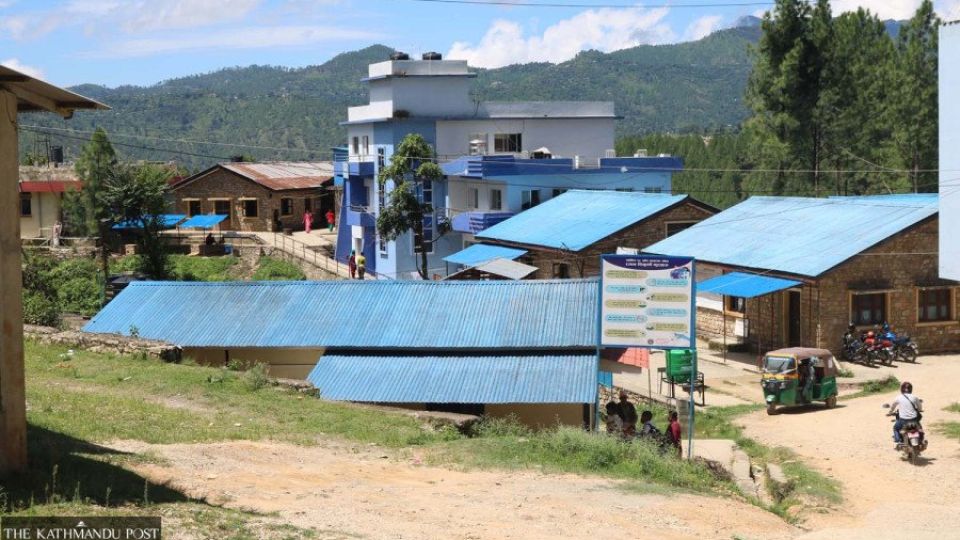October 3, 2023
KATHMANDU – Kiran BC from ward 3 of Chhatreshawri Rural Municipality took his ailing mother to the District Hospital in Salyan three days ago for treatment. His mother was suffering from a high fever and BC was expecting some relief for his mother after reaching the hospital. However, when the 35-year-old reached the hospital, he was disappointed to know that the hospital did not have the necessary medicines to treat his mother.
The hospital staff asked BC to visit the nearest pharmacy to buy medicines for his mother’s treatment. Government hospitals should provide certain medicines free of cost to their patients, but the District Hospital did not, complained BC.
“I went to the Shrinagar market to buy medicines. I had some money, but it took me an hour to buy the medicines and return to the hospital,” said BC. “The hospital was filled with patients of viral fever, cough, cold and various other ailments. Everybody was rushing to manage medicines for their sick relatives. The hospital is not providing medicines that are supposed to be provided to patients for free.”
The Ministry of Health and Population provides more than 70 different types of medicines for communicable and non-communicable diseases to all district hospitals with at least 25 beds.
Patients are entitled to receive more than 60 types of essential medicines at primary healthcare centres and 35 types of drugs at health posts free of cost.
The District Hospital cites logistical issues behind the shortage of essential medicines at the hospital. According to the hospital authorities, they ran out of essential medicines a week ago and have yet to replenish their supply.
“The District Health Office is yet to appoint a chief after the former head of the office was transferred a month ago. The health office who procures essential medicines that are distributed to various public hospitals has not been able to supply essential medicines in the absence of the head official,” said Thalraj DC, the information officer of the District Hospital.
According to DC, the hospital is facing a shortage of more than 50 types of essential medicines that should be provided to patients for free. “The hospital does not have medicines for fever, cold and seasonal flu. Medicines shortage has made the treatment of patients suffering from such ailments has become difficult. Patients from all over the district visiting the hospital have been suffering,” said DC. “The District Health Office has the authority to call tenders and purchase medicines before hospitals run out of supply, but that process is on hold because of the absence of the authorising official.”
Around 100 to 150 patients visit the hospital on a daily basis. “Among them, more than 50 percent of the patients come to the hospital seeking treatment for viral fever, cold and flu,” said DC.
Chhabilal Rana, a 25-year-old man from ward 1 of Sharada Municipality, took his neighbour to the hospital for the treatment of viral fever, and upon reaching the hospital, he also had to purchase medicines from a local pharmacy.
Rana said that the service and treatment provided by the doctors and health workers at the hospital are good, but due to a lack of necessary medicines, patients have been facing difficulties. “People who can afford to go to private hospitals and clinics don’t have to face this issue. The government provisioned free medicines for those of us who cannot visit private hospitals, but the negligence of the authorities have left poor people with nowhere to go,” said Rana.
Due to the shortage of medicines at the District Hospital, patients have been forced to go to Khalanga and Shrinagar markets to purchase medicines.
Dr Abhishek Singh, Doctor of Medicine in General Practice (MDGP) at the hospital, said that in recent times, the number of viral and high fever patients has increased, but the hospital does not have the necessary medicines including injections to treat the patients.
“We are working with a limited supply that will last us, maybe, four days. We haven’t been able to provide medicines to every patient,” said Singh. “We may soon have problems running the emergency ward at the hospital if the shortage persists.”
The Ministry of Social Development, Karnali Province, appoints a chief at the District Health Office immediately after the transfer of the incumbent chief.
According to Bhojraj Kafle, secretary of the Ministry of Social Development, since the transfer of the former chief of the health office, Purja Acharya, a month ago, the ministry appointed his replacement, but due to technical and legal issues, the new chief could not join duty.
“The ministry should have sorted out the legal and technical issues before appointing the new chief. The ministry is now working to appoint another person to the post,” said Kafle. “As soon as the transfer is successful, the first order of business will be to purchase medicines and send them to the District Hospital.”


